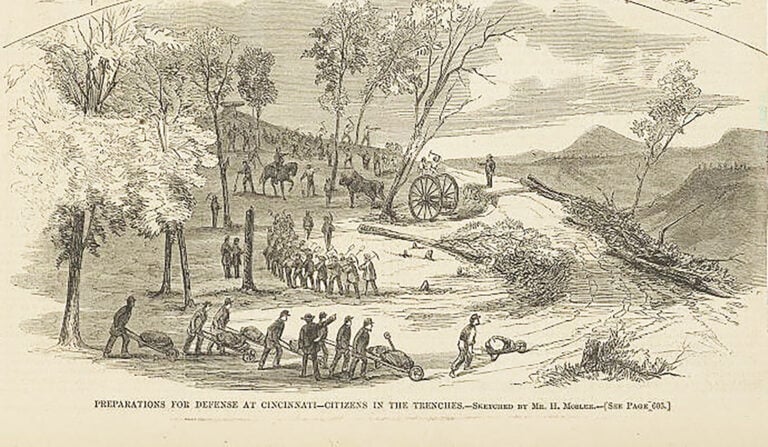By Don Heinrich Tolzmann
Special to NKyTribune
Wikipedia is often criticized for its inaccuracy, so when I found the following reference on Frankfort, I thought it was a good example: “The site evidently received its name after an incident in 1780, when pioneer Stephen Frank was killed in a skirmish with Native Americans; the crossing was named ‘Frank’s Ford’ in his memory.” However, I then checked the Kentucky Encyclopedia (1992) and found the same story.

A more plausible explanation can be found in the historical marker in Frankfort that has the following inscription: “Frankfort takes its name – many people believe – from an episode that took place near here during the frontier era. A group of explorers camping near the mouth of Benson Creek was attacked by Indians. One member of that group, Stephen Frank, was killed. After that, people began to refer to the Kentucky River crossing point here as Franks Ford. Over time this changed to Frankfort. Another theory holds that the town was named for Frankfurt, Germany.” It also notes that Frankfort was established in the 1780s.
The marker gets closer to the truth by noting that there are two theories, and that the Franks Ford story is only one of them. The other is that Frankfort is named for Frankfurt. As a historian of German immigration, settlement, and influences, I believe that the former theory strikes me as legend, whereas the latter looks more tenable, as it reflects Kentucky’s German heritage. Local historians not conversant in German are no doubt unaware of German-language sources on local and regional history. For that reason, I have translated and edited such works, including those by Cincinnati’s H. A. Rattermann (1832–1923).
Rattermann was a German-American historian and editor of Der Deutsche Pionier, a historical journal published in Cincinnati. He wrote a series of articles on German immigration and settlement in Kentucky that I translated as: Kentucky’s German Pioneers: H.A. Rattermann’s History (2007). Rattermann wrote: “Nowhere else, with the exception of Pennsylvania, Texas, and Wisconsin, was the settlement of a region by Germans so important as in Kentucky, and nowhere else has their role been so forgotten. The number of German hunters and settlers, who came to Kentucky in the 18th and early 19th centuries, is substantial and a number of the most important pioneers of the state bear German names …”
Rattermann mentions Frankfort’s founders as General James Wilkinson, Daniel Gano and Daniel Weisiger, citing Lewis Collins’ History of Kentucky (1874). I checked the history, and found that it notes (Vol. 2, p. 707) that Gano came to Kentucky with Wilkinson as a captain in the army, and was among the first settlers of Frankfort, and with others, including Daniel Weisiger, laid out the city in 1787. All three of them were veterans of the American Revolution. The Find-a-Grave website provides information on Weisiger, who like Gano, was a captain in the army.
Find-a-Grave indicates that Captain Daniel Weisiger III (1763-1829) was an “Early Frankfort merchant, farmer, county clerk, city trustee, first postmaster, and host of Weisiger House.” It also indicates that he was the grandson of Daniel Weisiger I (1710–1758), a German immigrant who came to America about 1731, and settled in Chester, Chesterfield County, Virginia. His son, Daniel Weisiger II (1738–1784), was born there also. His grandson served in the American Revolution, and thereafter came to Kentucky.

Weisiger is a good example of an early Kentuckian of German heritage. Kentucky usually is not thought of as a German heritage state, however, by 1790, the state’s population of German origin numbered 14%, according to the Kentucky Encyclopedia. It also notes: “Many Kentuckians are probably unaware that Germans and those of German descent were among the early European explorers and settlers of Kentucky.”
Rattermann lists many Germans who came to Kentucky, and notes that those going to what became Frankfort were led there by Weisiger. He also notes that most of them were from Frankfurt am Main or Hanau, which is now part of the Frankfurt am Main metropolitan area. It would therefore not be surprising that Frankfort, Kentucky would be named for the hometown of these early German settlers.
Given these considerations, references to the historical origin of the name of Kentucky’s capital city should be revised, replacing the Franks Ford story, with the more plausible explanation that the city’s name reflects Kentucky’s German heritage.
Don Heinrich Tolzmann is a nationally and regionally noted historian of German Americana. He has written and edited dozens of books, and contributed to many others, including The Encyclopedia of Northern Kentucky.
Paul A. Tenkotte, PhD is Editor of the “Our Rich History” weekly series and Professor of History at Northern Kentucky University (NKU). He can be contacted at tenkottep@nku.edu. Tenkotte also serves as Director of the ORVILLE Project (Ohio River Valley Innovation Library and Learning Engagement).

















